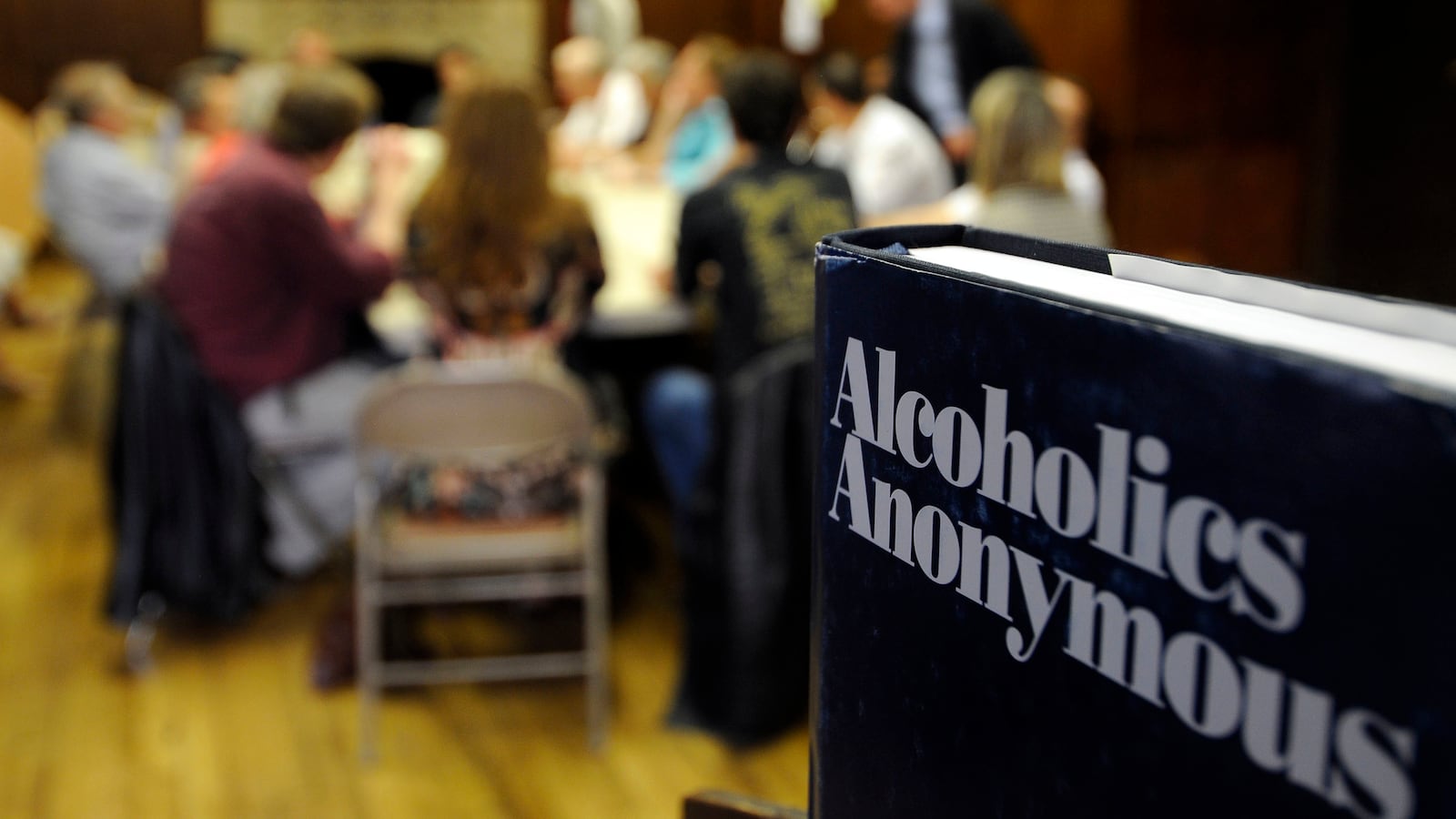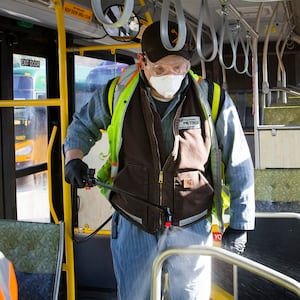Twelve-step meetings often end with the group holding hands.
But as COVID-19 spreads rapidly throughout the globe, that ritual has become fraught with risk. Instead, those Americans still showing up to Alcoholics Anonymous and similar meetings—that is, leaving their houses amid escalating panic—tend to stand elbow-to-elbow. And even that may not last much longer.
Soon, at least in America’s largest city, there’s the possibility there won’t be any in-person meetings at all.
This week, AA’s NY Intergroup, a state arm of Alcoholics Anonymous that runs the New York chapter of the program, informed volunteers and members that, starting Saturday, it will be closing its office, and most meetings will likely move to phone calls and online-only.
Along with work-from-home mandates, the cancellation of Broadway shows, and entire county lockdowns, that may seem like just another attempt at social distancing in the age of deadly contagion. But even if there are life-altering implications for everyone, and the elderly are at unique risk, people in recovery are a particularly affected population when denied their fa e-to-face support system to help avoid substance misuse.
It’s not just a New York problem, either. A staff member at the Seattle branch of AA, who did not share their name, told The Daily Beast on Friday that there were rumors of the city’s branch closing down as well. (Lara Randolph, assistant office manager at that branch, subsequently told The Daily Beast there were no plans to shut down.) But for now, it was letting each group decide whether to stay open as long as they followed coronavirus-specific hygiene guidance from AA proper. Ohio’s Cleveland chapter released a similar statement.
One woman in recovery, who also requested anonymity before describing her history of alcohol problems, was living in Northern Texas, the area with almost half of the state’s total COVID-19 cases. She said groups were dwindling in numbers there as well, though no official closure of any 12-step programs in the area had been announced yet. With 21 years of sobriety, she told The Daily Beast that for her, a support network remained essential for staying on track in recovery.
“I'm fearful of losing my peers,” she said. “I'm scared we're going to lose people.”
“To be fair, people early in sobriety aren't really healthy,” she added. “It's not a matter of convincing people to get healthy—it's making sure they stay alive.”
The woman said she would still have phone call check-ins and small pot-luck gatherings with her fellow group members if face-to-face meetings ended, but that it wouldn’t be the same as the structured group meetings.
“For me, there's things missed with tenation, sarcasm, or jokes. Sometimes things that are said, that are in the moment, especially if it’s a closer knit group,” she said. “People who get sober, we have the ability to laugh at some of the horrible stuff that happened, and that doesn't carry over online.”
Emily McCombs, an editor in New York City, said she relied heavily on 12-step meetings to maintain her sobriety, attending them weekly. A 36-year-old single mom, she has been in recovery since she was 25.
“Knowing at any given time I can go somewhere at any time where people can offer support is essential,” she said. “It’s the support and the accountability. As much as the coronavirus is a life and death issue, recovery is a life and death issue for addicts. If we don’t do what we need to do, we could die.”
The cancellation of meetings was an unprecedented prospect, according to recovery community members canvassed by The Daily Beast.
“I’ve seen people show up in a blizzard,” McCombs added.
Molly Jong-Fast, a recovering alcoholic also in NYC (and a contributing editor at The Daily Beast), echoed that sentiment.
“I went to an AA meeting on 9/11—we stayed open on 9/11,” she said.
The New York City Intergroup Director told The Daily Beast that face-to-face meetings are the foundation of AA, with over 600 of them happening on a daily basis in New York alone. But the crisis is very much “affecting our program,” she noted.
Alternatives to regular meetings include online group-meetings, through video-conferencing portals like Google Hangouts and Zoom, the director said. Members are also encouraged to call their sponsors and peers directly.
The New York Office of Addiction Services and Supports (OASAS) released the following statement to The Daily Beast when asked how they will offer support and services to those struggling in the state amid the pandemic.
“OASAS has issued guidance to our providers regarding the spread of COVID-19 on several occasions, including measures that they should be taking to protect against the spread of the disease, as well as ways that they can continue to reach their clients,” it reads. “All guidance documents issued by the agency can be found on our website. We are working closely with our providers during this time to avoid any interruption to our services.”
In addition to calling and smaller peer-to-peer meetings, Jong-Fast said she planned to get rid of the alcohol in her house. She’s been sober for 22 years, but doesn’t want to take a risk, although she will make a concession for candy and movies. “It’s like a long sleepover,” she said.
Yet the anxiety remains, and may be especially acute for those new to sobriety.
A person who asked to go by her last name only, Disco, fell into this category.
“[I’m] definitely more nervous, the ritual and comforting physicality of the rooms is a huge part of it for me,” she told The Daily Beast. “Plus the Whatsapp group I have is almost all newbies, it’s like the blind leading the blind.”
Still, people like McCombs who have been in recovery for decades know that this time won’t be easy for 12-step veterans, either.
“It takes a village to keep me sober. I need a therapist, I need 12-step support, I need friend interaction, a support system. I need medication. There are all these things I need to do to protect my sobriety, and they’re all things being threatened by the current climate,” she said.
Despite the challenges, those in recovery were committed to staying the course, even if it meant prioritizing staying sober over fears about actually contracting the virus.
“Being sober is more important,” said Jong-Fast. “If I’m not sober, it doesn't matter if I catch it.”







